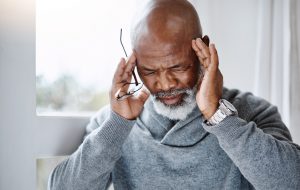 June is National Migraine and Headache Awareness Month. According to the World Health Organization (WHO), headache disorders are some of the most common disorders of the nervous system. The WHO also states that 1 in 7 adults worldwide has migraines and that it can be three times more common in women than men.
June is National Migraine and Headache Awareness Month. According to the World Health Organization (WHO), headache disorders are some of the most common disorders of the nervous system. The WHO also states that 1 in 7 adults worldwide has migraines and that it can be three times more common in women than men.
Headache is a general term that describes the pain in the scalp, head, and neck. There are many different types of headaches. They may be primary conditions such as tension headaches, migraines, and cluster headaches, or they may occur due to underlying health conditions.
Tension headaches are the most common type of headache and are more common in women. People often experience occasional tension headaches and don’t seek medical care. If you are experiencing tension headaches for 15 days or more a month, consult your primary care provider.
Causes of Tension Headaches:
- Stress
- Anxiety
- Depression
- Alcohol
- Caffeine or caffeine withdrawal
- Dental problems such as frequently grinding your teeth or clenching your jaw.
- Eyestrain
- Keeping your head in one position for a long time.
- Not getting enough sleep.
Symptoms of tension headaches typically feel like dull pressure around the head. You may also feel muscle tightness in your head or neck. The pain is usually mild to moderate and is not accompanied by other symptoms. Tension headaches can last from half an hour to a week.
Ways to treat and prevent tension headaches:
- Exercising regularly
- Getting enough sleep
- Maintaining good posture while seated and taking breaks from sitting.
- Managing daily stress
Migraines are a severe, recurring type of headache that is often debilitating. Migraines have four phases which are prodrome, aura, migraine headache, and postdrome.
Although the exact cause of migraines is unknown, researchers believe genetics are a factor.
There are a few conditions and lifestyle factors that can trigger a migraine:
- Anxiety
- Bipolar disorder
- Depression
- Epilepsy
- Sleep disorders
- Caffeine or withdrawal from caffeine
- Certain medications or taking particular medications too often
Migraines are more likely to occur in the morning, making it common to wake up with a migraine. Some people have a predictable pattern or migraines, such as just before a menstrual period. Other people may have trouble recognizing what triggers their migraines.
There is no cure for migraines but they can be managed and prevented with over-the-counter triptans and pain relievers.
Cluster headaches are sudden, severe headaches on one side of the head that peak within the first 10 minutes. You may also have a stuffy nose, drooping eyelid, a watery eye, and swelling or redness on the same side as the pain.
The cause of cluster headaches is unknown, but they often run in families and affect more men than women.
Here are some triggers of cluster headaches:
- Alcohol
- Being exposed to heat
- Bright lights
- Overexertion
- Processed foods
- Smoking
Cluster headaches, especially acute ones are often treated with anti-inflammatories, triptan medications, and DHE injections.
If you commonly experience migraines or headaches, you can receive specialized treatment from a neurologist at Jamaica Hospital Medical Center’s Ambulatory Care Center. To schedule an appointment, please call (718) 206-7001.
All content of this newsletter is intended for general information purposes only and is not intended or implied to be a substitute for professional medical advice, diagnosis or treatment. Please consult a medical professional before adopting any of the suggestions on this page. You must never disregard professional medical advice or delay seeking medical treatment based upon any content of this newsletter. PROMPTLY CONSULT YOUR PHYSICIAN OR CALL 911 IF YOU BELIEVE YOU HAVE A MEDICAL EMERGENCY.
